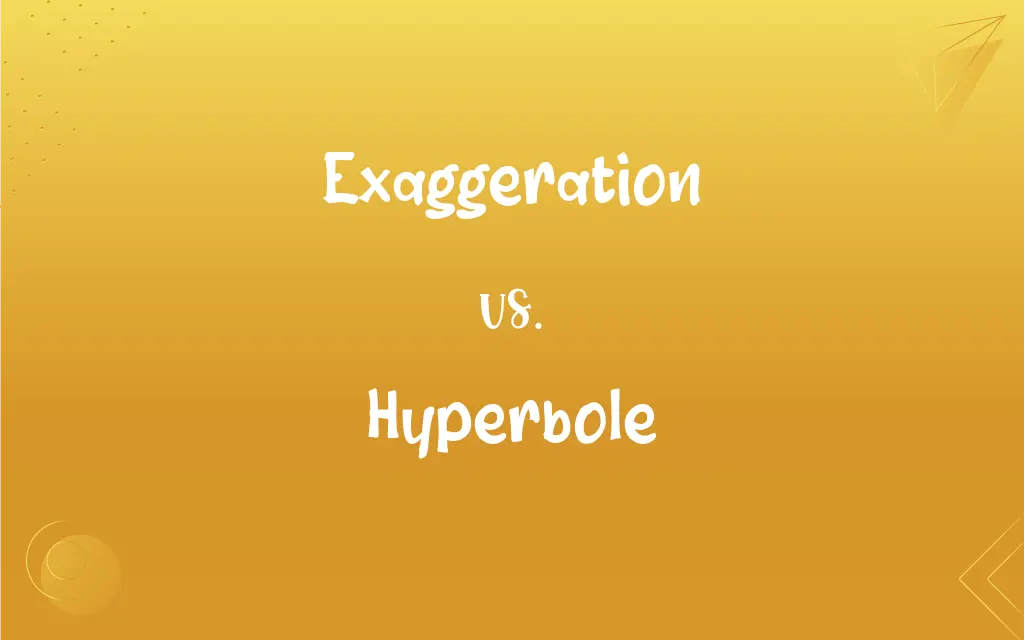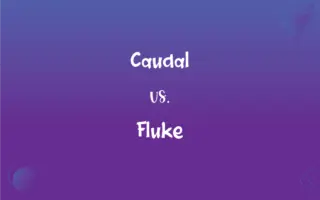Exaggeration vs. Hyperbole: What's the Difference?
Edited by Aimie Carlson || By Janet White || Updated on October 7, 2023
"Exaggeration" is the act of making something seem more significant than it is, while "Hyperbole" is a figure of speech that uses extreme exaggeration for emphasis or effect.

Key Differences
"Exaggeration" refers to any overstating or magnification of a statement, fact, or description. "Hyperbole," on the other hand, is a deliberate, stylistic tool used in literature and rhetoric for emphasis, typically found in idiomatic expressions.
While both "Exaggeration" and "Hyperbole" involve overstatement, "Exaggeration" can be intentional or unintentional. In contrast, "Hyperbole" is always intentional and is often used for comedic or dramatic effect.
People might use "Exaggeration" in daily conversation to emphasize a point or to describe something more impressively. However, when someone uses "Hyperbole", they aren't expecting the listener to take the statement literally; it's meant for dramatic flair.
In terms of literary devices, "Hyperbole" has a set place, especially in poetry, to elicit strong emotions or create a vivid image for the reader. "Exaggeration" doesn't hold the same stylistic function in literature but is rather a broader term encompassing all forms of overstating.
Another differentiation point between "Exaggeration" and "Hyperbole" lies in recognition. While "Exaggerations" can sometimes be mistaken for truth, "Hyperboles" are so extreme that they're generally easily identified as non-literal statements.
ADVERTISEMENT
Comparison Chart
Definition
Overstating something.
Extreme exaggeration for effect.
Intent
Can be intentional or unintentional.
Always intentional.
Use in Literature
Broad term; not specific to literature.
Literary device used for emphasis.
Recognizability
Can be mistaken for truth.
Easily identified as non-literal.
Function
Magnifies or diminishes.
Evokes strong emotion or creates vivid imagery.
ADVERTISEMENT
Exaggeration and Hyperbole Definitions
Exaggeration
Representing in excessive terms.
The movie's plot was pure exaggeration.
Hyperbole
Exaggerated statements not meant to be taken literally.
I'm so hungry I could eat a horse.
Exaggeration
The act of overstating or overemphasizing.
He's always exaggerating his achievements.
Hyperbole
A means of expressing strong feelings or creating a strong impression.
Her beauty was beyond hyperbole.
Exaggeration
Magnifying beyond the limits of truth.
Her story was a wild exaggeration of the facts.
Hyperbole
An extreme magnification beyond reality.
The bag weighed a ton.
Exaggeration
Making something appear larger or greater.
His estimate was a slight exaggeration.
Hyperbole
A figure of speech using deliberate exaggeration for emphasis.
I've told you a million times to clean your room!
Exaggeration
Extending beyond the proper degree.
His reaction was an exaggeration to a simple joke.
Hyperbole
An overstatement to make a point.
It took him ages to finish the task.
Exaggeration
To consider, represent, or cause to appear as larger, more important, or more extreme than is actually the case; overstate
Exaggerated his own role in the episode.
Exaggerated the size of the enemy force.
Exaggerated how difficult the project would be.
Hyperbole
A figure of speech in which exaggeration is used for emphasis or effect, as in I could sleep for a year or This book weighs a ton.
Exaggeration
To make overstatements.
Hyperbole
Deliberate or unintentional overstatement, particularly extreme overstatement.
Exaggeration
The act of heaping or piling up.
Hyperbole
(countable) An instance or example of such overstatement.
Exaggeration
The act of exaggerating; the act of doing or representing in an excessive manner; a going beyond the bounds of truth, reason, or justice; a hyperbolical representation; hyperbole; overstatement.
They say he's a millionnaire, but that's a massive exaggeration.
Hyperbole
A hyperbola.
Exaggeration
A representation of things beyond natural life, in expression, beauty, power, vigor.
Hyperbole
A figure of speech in which the expression is an evident exaggeration of the meaning intended to be conveyed, or by which things are represented as much greater or less, better or worse, than they really are; a statement exaggerated fancifully, through excitement, or for effect.
Our common forms of compliment are almost all of them extravagant hyperboles.
Somebody has said of the boldest figure in rhetoric, the hyperbole, that it lies without deceiving.
Exaggeration
The act of heaping or piling up.
Hyperbole
Extravagant exaggeration
Exaggeration
The act of exaggerating; the act of doing or representing in an excessive manner; a going beyond the bounds of truth reason, or justice; a hyperbolical representation; hyperbole; overstatement.
No need of an exaggeration of what they saw.
Exaggeration
A representation of things beyond natural life, in expression, beauty, power, vigor.
Exaggeration
Extravagant exaggeration
Exaggeration
The act of making something more noticeable than usual;
The dance involved a deliberate exaggeration of his awkwardness
Exaggeration
Making to seem more important than it really is
FAQs
Why is hyperbole used in literature?
Hyperbole is used for emphasis, to evoke strong emotions, or to create a vivid image.
Are all hyperboles exaggerations?
Yes, all hyperboles are forms of exaggeration, but not all exaggerations are hyperboles.
Is hyperbole common in poetry?
Yes, hyperbole is a popular literary device in poetry for emphasis.
Is overstatement synonymous with exaggeration?
Yes, overstatement is another term for exaggeration.
Can exaggerations be unintentional?
Yes, exaggerations can be either intentional or unintentional.
Can an exaggeration be believed as truth?
Yes, some exaggerations might be perceived as truth if not too overstated.
Can hyperbole be used in formal writing?
While it can be used, it's less common in formal writing than in literature or casual conversation.
Is hyperbole meant to be taken literally?
No, hyperbole is an extreme exaggeration not intended for literal interpretation.
Are exaggerations always verbal?
No, exaggerations can be presented in various ways, including visually.
Does exaggeration have a place in factual reporting?
Ideally, factual reporting
About Author
Written by
Janet WhiteJanet White has been an esteemed writer and blogger for Difference Wiki. Holding a Master's degree in Science and Medical Journalism from the prestigious Boston University, she has consistently demonstrated her expertise and passion for her field. When she's not immersed in her work, Janet relishes her time exercising, delving into a good book, and cherishing moments with friends and family.
Edited by
Aimie CarlsonAimie Carlson, holding a master's degree in English literature, is a fervent English language enthusiast. She lends her writing talents to Difference Wiki, a prominent website that specializes in comparisons, offering readers insightful analyses that both captivate and inform.































































